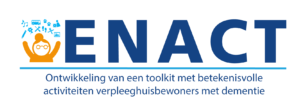In co-creation with healthcare professionals, family, and volunteers, a toolkit will be developed with ‘best practices’ to support caregivers when choosing and performing meaningful activities for people with severe dementia living in Dutch nursing homes.
Meaningful activities are activities that provide the person with dementia a sense of pleasure. They match the interests, habits, roles, and routines of the person with dementia, and are suited to the individual’s capabilities. Not all people benefit from the same activities. Successful meaningful activities may improve quality of care, quality of life, and social relationships between people with dementia and their caregivers. Choosing and implementing meaningful activities in practice is difficult. The aim of this study is to develop a toolkit (in co-creation) that supports family and professional caregivers in choosing, performing, and evaluating meaningful activities for nursing home residents with dementia.
We have already conducted a survey, focus groups, and in-depth interviews. The results of the nationwide survey show that 129 different activities are offered in nursing homes and most of the healthcare professionals, volunteers, and informal caregivers expect them to contribute to the QoL of residents. Healthcare professionals, volunteers, and informal caregivers were involved in offering and performing meaningful activities. In addition, the focus groups and in-depth interviews gave us more insight into the process of choosing an activity for a resident and the facilitators and barriers when choosing and performing meaningful activities.
Based on the previous results, a first provisional version of the toolkit will now be developed. This first version of the toolkit contains multiple meaningful activities which can be selected to perform with the nursing home resident(s). The toolkit with meaningful activities for nursing home residents with dementia will be further developed in and with the collaboration of daily practice. Different methods will be used: think aloud, photo-elicitation, interviews, observations, reflection meetings, and questionnaires.

